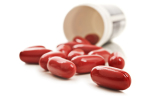Group: Health Supplements
Created: 2012/01/01,
Members: 102,
Messages: 16613
Supplements can be a great aid with your health and fitness goals. Combined with the proper exercise and nutritional plan they can be quite effective.
Join group
Pyruvate

duketter
Posts:
76
Joined: 2002/05/01  |
2002/06/27, 10:56 AM
I have did a search on pyruvate here and not much has been said to answer my question.....Is this stuff any good? It is suppose to be taken to decrease fat levels and that is what I am trying to do. Would this be a good alternative to fat burners like hydrocycut cut and xenadrine? I was wondering if I should start with something like pyruvate and try that for a while or just stay off of it? Anybody have any luck with it and how much does a person take in a day of this stuff? I take protein and creatine right now. |
|
| |

rpacheco
Posts:
3,770
Joined: 2001/12/13  |
2002/06/27, 12:12 PM
Pyruvate is a "salt" form of pyruvic acid - a 3-carbon molecule derived from the breakdown of glucose. The form of pyruvic acid found in dietary supplements is combined with various minerals such as sodium, calcium, magnesium or potassium to improve stability. In the body, glucose (6 carbons) is split into 2 pyruvic acid molecules (3 carbons each) in the end stages of cellular glycolysis. When enough oxygen is present, pyruvic acid can be converted into acetyl CoA in the mitochondrion of the cell to produce energy. Under anaerobic conditions, however, pyruvic acid becomes lactic acid, which can build up and lead to muscle fatigue. Claims: Enhances weight loss and reduces weight regain Decreases appetite Elevated energy levels Increased endurance levels Increases muscle glycogen Reduces fatigue Theory: Because glucose (the chief sugar used by cells for energy) is broken down body into pyruvic acid, an increased level of pyruvic acid in the body is theorized to enhance a cell’s ability to generate energy. Scientific Support: In general, the scientific support for pyruvate as either a weight loss aid or a way to boost energy levels is somewhat controversial. At least a couple of human studies, however, have shown that daily consumption of 25 grams of pyruvate plus 75 grams of DHA (another 3-carbon sugar derived from glucose) over one week can help improve endurance performance. For weight loss, subjects consuming pyruvate tend to lose somewhat more fat and weight (about 2-6 extra pounds) compared to control groups given a placebo. The problem, of course, is that these interesting results have really been blown out of proportion by wildly enthusiastic marketers at a number of companies (read more in Value section below). In one small study, 13 obese women consumed a low-calorie diet for 3 weeks along with dihydroxyacetone (DHA) and pyruvate. Subjects fed DHA and pyruvate showed a greater loss of weight and fat (about 2 lbs), compared to placebo. Another small study (14 subjects) by the same researchers, found again that subjects fed pyruvate showed a greater weight loss of about 2 –3 lbs compared to placebo over a period of several weeks while also consuming a low-calorie diet. A slightly larger study (34 subjects) fed a low calorie diet along with 22-44 grams per day of pyruvate or placebo for one month – again finding an enhancement of weight loss and fat loss (but no change in plasma concentrations of cholesterol, LDL, triglycerides or HDL). A more recent study took a somewhat different approach – looking not at promotion of weight loss, but at suppression of weight regain following weight loss. In this study, pyruvate and DHA were fed to 17 obese women (9 received the supplement, 8 received placebo) following 3 weeks of weight loss via a low-calorie diet. During the supplementation phase, subjects adhered to a “weight gain” diet providing calories at levels 50% above energy requirements. Results indicated that weight gain and fat gain were significantly less in patients receiving the supplement compared to placebo (again, about 2 lbs difference between groups) – suggesting that pyruvate and DHA supplements may be effective in helping to prevent weight regain following weight loss. Safety: No significant side effects are expected with the levels of pyruvate found in most commercially available dietary supplements (which is typically quite low due to the high cost of pyruvate). In some studies, subjects consuming relatively large doses of pyruvate have reported minor gastrointestinal disturbances such as diarrhea and flatulence. Value: Like many of the "newer" dietary supplement ingredients, don’t expect to find pyruvate products hanging out on the discount rack – pyruvate is NOT cheap. Prices typically fall in the $25 to $60 for a one-month supply – meaning that pyruvate is expensive, but not the most expensive supplement that you might run across. The main problem, however, is that the vast majority of commercial products contain only about 250-1500mg of pyruvate per serving – or about 100 times less than the levels shown to be effective in the clinical studies outlined above. Powdered forms are available that can increase serving sizes to 5 or 6 grams per serving, but we’re still looking at miniscule levels when compared to the 25-40 grams used in most studies. Dosage: Although 3-15 grams of pyruvate are typically recommended per day, this is more of a market consideration (people will actually pay for products with this much pyruvate). Most studies have used 20 grams or pyruvate or more (which would be far too expensive to sell as a dietary supplement). Most commercial preparations contain 500mg to 1 gram of pyruvate with 2-3 servings recommended per day. My opinion: It's just too expensive and there's not enough substantiation behind the results to warrant the purchase. The info. above came from http://www.supplementwatch.com/supatoz/supplement.asp?supplementId=236 -------------- **_Robert_** Pain is temporary; glory is forever! |
